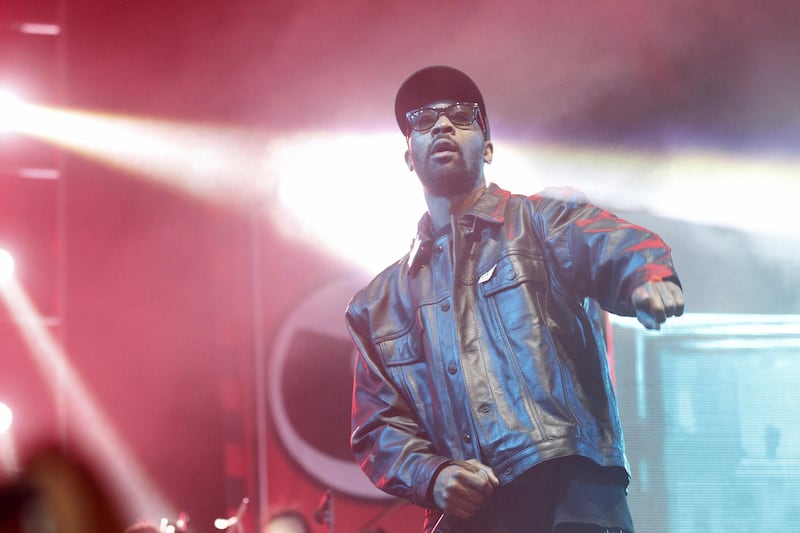Wu-Tang Clan's exclusive 2015 release, Once Upon a Time in Shaolin, is arguably the most controversial album of the decade – despite only three people having heard it in its entirety to date.
One of those people is Morocco-based producer Cilvaringz, who Skyped from his current home city of Marrakech for a rare discussion surrounding the making of the album in a sold-out weekend session at Amsterdam Dance Event.
The way he described it, the tale has the elements of a film drama with a regional twist.
It includes a fan's long journey to meet his idol, an epiphany in Egypt, secret recordings in Marrakech and a villain in the shape of arguably the world's most-hated man.
The story goes like this: to raise awareness on the general devaluing of music, enigmatic Staten Island hip-hop collective the Wu-Tang Clan took the extreme measure of auctioning the sole copy of a new album. As part of the contract, the owner is not permitted to resell it commercially for a period of 88 years and the fans can only hear it in a listening session as part of a public exhibition in a museum or gallery.
The winning bid, for US$2 million (Dh7.4m), was from none other than the brash pharmaceutical executive Martin Shkreli, who is presently kicking his heels in prison as he awaits sentencing for securities fraud.
As well as Cilvaringz, only Wu-Tang leader RZA and Skhreli have heard the album in its entirety.
It would be easy to dismiss the project as a publicity stunt if it wasn't for the artistic integrity that is a hallmark of the group, who number some of hip-hop's fiercest rappers, such as Ghostface Killah and Raekwon (pictured inset).
It all began in 1997 with a chance meeting between Cilvaringz and RZA at a Wu-Tang Clan performance in Amsterdam. Inspired by the interaction, Cilvaringz (real name Tarik Azzougarh) tracked down the producer in New York two years later in the hope of being signed as the group's first non-American affiliate. More impressed with his drive and production work than his rapping, RZA hired Cilvaringz as an in-house producer.
Work on what was to become Once Upon a Time in Shaolin began a in 2010, with Cilvaringz producing the instrumentals in Marrakech, and the group adding their vocals between tours. As the songs were slowly coming together, RZA and Cilvaringz holidayed in Egypt in 2013, where on top of Giza's Pyramid of Khufu, the duo were inspired to hatch the unorthodox strategy.
"I know it sounds kind of clichéd, but it is true," explains co-panellist Cyrus Bozorgmehr, who as well as being an adviser for the project also published a book on the experience, named after the album.
While fans took umbrage at not having the album available for their listening pleasure, Bozorgmehr says the philosophy behind the move justified the risk. "If recorded music is viewed as worthless, then let's symbolically attach a really expensive price tag to it to make a point that it actually something of value," he says. "And let's break this cycle that music is a consumer product that you update your phone.
“So we used the symbolic framework of the art world and sold the album as a piece of contemporary art. By the album going through that process and the fact that it was discussed in various parts of the society, then it meant we made an important artistic statement.”
Cilvaringz says that debate became even more pertinent when Shkreli purchased the album. "I have been telling everyone that this was the best thing to happen to us" he says.
“When putting this album out, we’re talking about the dystopian nature of the music industry, and what better embodiment of that dystopia than Martin Shkreli himself? If we don’t support and pay for music, then it would become increasingly privatised.
"We are already seeing that when it comes to the performance world with artists such as Beyoncé and Nelly Furtado performing private shows for Muammar Gaddafi. Now we are asking the question: 'What happens when recorded music is privatised?'"
That said, while stating the album is in the hands of Shkreli’s lawyers, Cilvaringz is not entirely confident the album will remain exclusive for 88 years. He explains the risk of exposure increases significantly if Shkreli’s sells the album (with the same conditions) to a new bidder, as he reportedly has planned.
"We guaranteed to Martin that when we gave him the album that there is no other example other than his," Cilvaringz states. "Now when it exchanges hands, then you don't know. Maybe someone saved a copy for themselves. Only it needs is one person making a copy and it is out there. Personally, while I do believe that it is one of the best albums Wu-Tang Clan have ever done, I love how it now has a mystique surrounding it. It is why we are still talking about it four years later."
Despite this, Wu-Tang's creativity has continued since the conception of Once Upon a Time in Shaolin. Earlier this month, the group dropped their eight album, The Saga Continues
_____________
Read more:
Confirmed: Kendrick Lamar completes Abu Dhabi F1 After Race Concerts line up
French Montana to perform in Abu Dhabi at F1 after-party
Iraqi-American rapper Julian on his debut single and launching an international music career from the UAE
_____________






